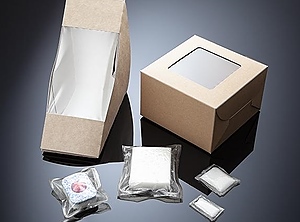RESEARCH
Scientists find compostable plastics with strength of spider silk
 Packaging incorporating Xampla’s plant-based plastics (Photo: Xampla) |
Researchers at Cambridge University have created a polymer with the strength of spider silk by assembling a series of plant proteins into a material that mimics the silk on a molecular level. The researchers, who have published a paper on their findings in the journal nature communications, claimed the new material is compostable, as strong as many polymers currently in use, “and could replace plastic in many common household products”.
PhD candidate Ayaka Kamada, the paper’s first author, said, “Very little is known about the self-assembly of plant proteins, and it’s exciting to know that by filling this knowledge gap we can find alternatives to single-use plastics.”
The new material, said to be home compostable, is to be commercialised by Xampla, a Cambridge University spin-off company currently developing replacements for single-use plastics and microplastics. The company plans to introduce a range of single-use sachets and capsules later this year, which can replace the plastics used in products such as dishwasher tablets and laundry detergent capsules.
PhD candidate Ayaka Kamada, the paper’s first author, said, “Very little is known about the self-assembly of plant proteins, and it’s exciting to know that by filling this knowledge gap we can find alternatives to single-use plastics.”
The new material, said to be home compostable, is to be commercialised by Xampla, a Cambridge University spin-off company currently developing replacements for single-use plastics and microplastics. The company plans to introduce a range of single-use sachets and capsules later this year, which can replace the plastics used in products such as dishwasher tablets and laundry detergent capsules.
10.08.2021 Plasteurope.com [248271-0]
Published on 10.08.2021
